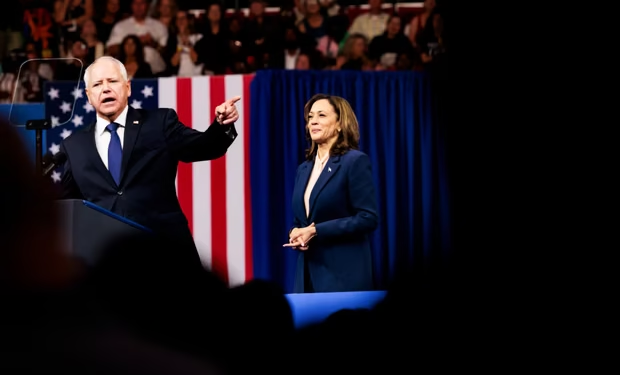Kamala Harris’s upcoming memoir, 107 Days, offers a behind-the-scenes look at her ill-fated 2024 presidential campaign, and in the process, reveals more than a few cracks in the Democratic Party’s carefully managed image. The former nominee admits to being dismayed as her running mate, Minnesota Governor Tim Walz, “fumbled” a pivotal debate moment against Republican Senator JD Vance.
The book, set for release next week, paints a revealing picture of frustration and second-guessing at the highest levels of the Democratic ticket. Harris recalls the October 1st debate in New York, moderated by CBS, where Walz was expected to serve as the campaign’s “closer.” Instead, according to Harris, he was drawn into what she described as Vance’s “fake bipartisanship” act. “When Tim fell for it and started nodding and smiling at JD’s fake bipartisanship, I moaned to Doug, ‘What is happening?’” she writes.
Harris admits she was stunned to see her running mate appear friendly toward the man aggressively attacking her candidacy. “I told the television screen: ‘You’re not there to make friends with the guy who is attacking your running mate.’”
But the most damaging moment came when Walz was pressed by moderators on his past claim of being in Hong Kong during the Tiananmen Square protests. Rather than correcting the record with a straightforward acknowledgment and pivoting to a larger message on human rights, Walz “talked about biking in Nebraska.” Harris describes the moment bluntly: “Then he fumbled his answer when the moderator, predictably, questioned why he had claimed to be in Hong Kong during the democracy protests in Tiananmen Square.”
It was a blunder that drew laughs from the public. Even Saturday Night Live quickly parodied Harris and her husband Doug Emhoff watching the debate unfold. “While I did not in fact spit out wine, it was otherwise uncanny in its portrait of our evening,” Harris writes wryly.
While Harris reassured Walz afterward that the debate did not decide the election, she concedes that the stumble underscored larger concerns about his effectiveness on the national stage. According to the memoir, Walz “felt bad” for his performance but remained the choice of Harris’s inner circle, including her sister Maya and godson Alexander.
What makes this account more telling is Harris’s admission that Walz was never her preferred running mate. In fact, she reveals that her “first choice” had been then–Transportation Secretary Pete Buttigieg, whom she calls a close friend. Yet Harris confesses the optics worried her: “He would have been an ideal partner – if I were a straight white man. But we were already asking a lot of America: to accept a woman, a Black woman, a Black woman married to a Jewish man. Part of me wanted to say, Screw it, let’s just do it. But knowing what was at stake, it was too big of a risk. And I think Pete also knew that – to our mutual sadness.”
The passage reveals much about the way Democratic leaders calculate electoral risks, even as they speak publicly about breaking barriers. Harris’s description reflects the party’s constant struggle to balance identity politics with political viability, a tension that often undermines its message of inclusivity.
The title 107 Days refers to the length of the campaign Harris inherited after President Joe Biden’s decision to seek re-election, which she characterizes in the book as “recklessness.” That single word choice speaks volumes about internal Democratic divisions and frustrations, as well as the doubts surrounding Biden’s decision-making at a time of deep national uncertainty.
Taken together, Harris’s reflections tell a story of a campaign weighed down by missteps, image management, and the constant political calculations that come with trying to hold together a fractious coalition. For conservatives, it underscores a broader point: leadership requires steadiness, clarity, and accountability. A campaign that leaned heavily on managing appearances rather than projecting strength found itself undone by its own contradictions. Harris’s memoir may have been written as an inside look at her campaign, but it ends up exposing the very weaknesses that voters themselves had already sensed.




















